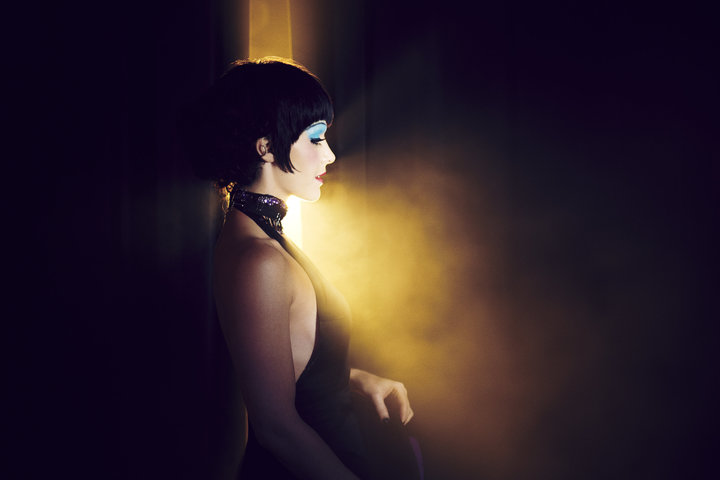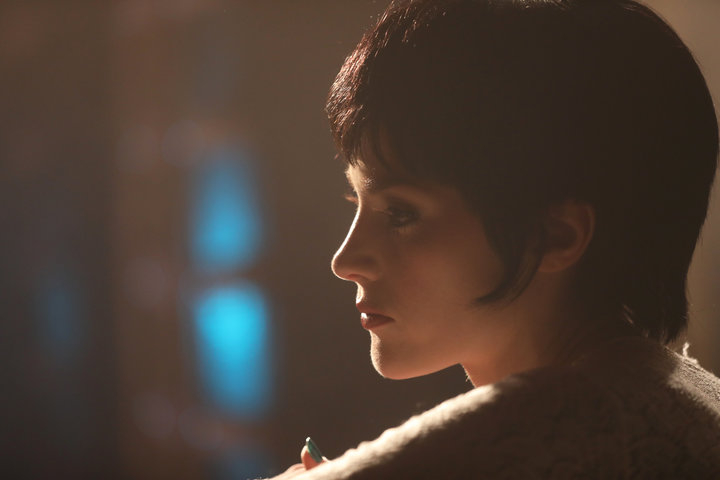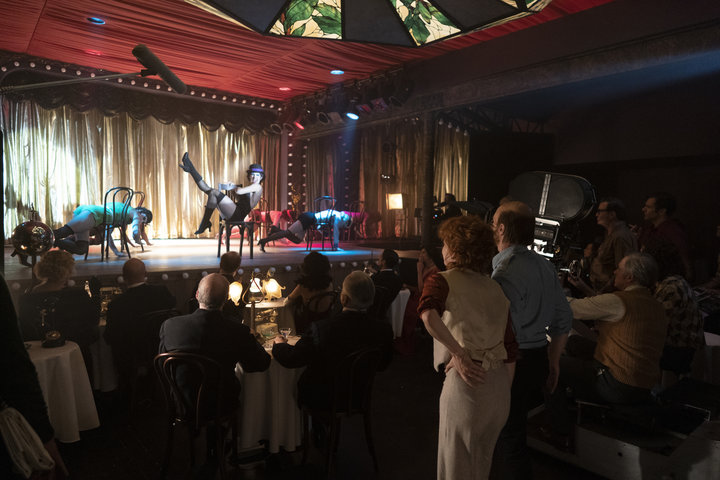[ad_1]
Sporting a fur coat and pixie cut, a bubbly Liza Minnelli shows up halfway through the first episode of FX’s “Fosse/Verdon,” clutching her tiny dog and smiling as she greets choreographer and director Bob Fosse at a production party in Munich, Germany. “Bobby, darling,” she says. “I’ve been counting down the hours for this day to arrive.” Soon enough, she’s wearing blue eyeshadow and a tiny black ensemble, doing high kicks in front of the cameras as she belts out the musical number “Mein Herr.”
Of course, it isn’t actually Liza Minnelli we’re witnessing, but stage actress Kelli Barrett, playing the daughter of Judy Garland during her Oscar-winning run as Sally Bowles in 1972’s movie-musical “Cabaret.”
Barrett was given the daunting task of channeling one of the most well-known performers in Hollywood history in “Fosse/Verdon,” an eight-episode limited series that details the romantic and creative partnership between womanizing dance maestro Fosse (Sam Rockwell) and his charming muse Gwen Verdon (Michelle Williams) over five decades. It’s a story seen through the keen eyes of theater masters Thomas Kail, Steven Levenson, Joel Fields and Lin-Manuel Miranda.

As expected, Barrett was panic-stricken when she learned she was cast to play the larger-than-life Liza, who’s now 73. The beloved, energetic mezzo-soprano has been parodied time and again (see: Kristin Wiig’s wacky “SNL” impersonation), but Barrett manages to avoid turning her into a caricature.
“It was terrifying and thrilling, and sort of everything we as masochistic artists want,” she laughed over the phone during a chat with HuffPost last week. “I always say if it doesn’t scare me, it’s not worth doing, and it was very scary because the truth is I can only fail.”
Below, Barrett ― who’s appeared in everything from Broadway’s “Wicked” and “Baby It’s You” to Marvel’s “The Punisher” ― delves into portraying Liza, working with movie stars and what the future holds for small- and big-screen musical adaptations.

You’ve worked a bit in TV, but primarily on the stage. So what was it about “Fosse/Verdon” that caught your attention?
It’s really an opportunity for me to meld both of those worlds, which is not something I get to do very often. It’s something a lot of people on the theater side are dreaming to do — somehow incorporate all their talents into one thing. So that was amazing because it was absolutely requiring all of my theater skills, but at the same time, I had to know how to work the camera. It was just one of those amazing moments where you’re like, “Wow, my complete self is present.”
The showrunners further represent the idea that this show is a Broadway production of sorts. Were you in talks with these gentlemen before getting cast as Liza Minnelli?
No, it was very traditional for me. I got sent a breakdown for an audition and it was a simultaneous “I was born to play this role” and “I will never, ever get this role.” [Laughs.] I just honed in on it, went to the audition and did my best. They had a great response and then brought me back for a work session, and I spent about 45 minutes in a room with the whole creative team.
Did you perform “Cabaret” for them?
I had to do “Mein Herr” and “Cabaret,” and then they gave me a couple of scenes to see how I would behave as Liza. What they didn’t have me do was dance, so when I got the role and found out that I would be dancing, I was like, “Wow, they’re really trusting!” It’s funny because they said [choreographer] Andy Blankenbuehler could tell just from the way I interpreted the material that I had it, so I thought that was really cool.
Then I had a one-on-one dance assessment with him and his assistant, and he gave me some choreography from “Hot Honey Rag” that I had actually done in my arts high school when I played Roxie Hart, so I was like, “Oh, I remember this!” And he was like, “I’m not worried about you. You’re going to be great.” And I got to work in a lab with Valarie Pettiford, one-on-one, teaching me “Mein Herr” on and off for two weeks.
Clearly, you had seen “Cabaret” and knew of Liza’s performance as Sally Bowles. But what was it like for you to not only perform that music but perform it as Liza herself?
Oh, it was terrifying. No one will ever live up to Liza Minnelli. She’s singular. So you can only fail, and when that happens you give yourself the opportunity to fail big, to just go for it because you know you’ll never be here so you might as well just give it everything you have. There is no pulling it off, I guess? I hope I did to whoever’s standards, but I’ll never be her.
I mean, I remember the breakdown said something like “an undeniable star, incredible presence,” all this stuff that, at the end of the day, I don’t know what I have — I’m not good at self-assessment and knowing honestly if I have that; I hope I do — but all I could do was bring my all to it and hope that it would be enough.
It’s about telling the story because really, at the end of the day, we’re not pulling a hat trick and trying to convince you that we’re other people. That’s not the point. The story is the most important thing, not the impersonation. Once we were really dedicated to telling the story of Bob Fosse and the legacy and Liza Minnelli’s part in that, I was able to let go of the expectation and have a really good time. It’s definitely the most fun I’ve had in my career, for sure.
How did you get into the mindset of Liza at that point in her life? Were you able to talk with her or meet her?
I never did, no. I had a small interaction with her assistant who was on set one day, and we were talking about me meeting up with Liza. It hasn’t happened yet; maybe it still will. I’m sort of terrified of that moment I bump into her and she says, “Nope. That wasn’t it.” [Laughs.]
But [her assistant] was giving me insight about her. Judy Garland is one of my all-time favorites; I mean, every musical theater actress you talk to, it’s Judy and Liza. I grew up with them and they’d been in the fabric of my being since I [was] a child. So, for my part, I just watched everything I could ever get my hands on.
I tried to be honest with myself about, “What was the first thing that struck me?” And it’s her energy — she’s bursting with it. It’s almost manic. Tommy Kail described her as the eye of the hurricane — every time she performs, it’s like it’s the last time, it’s like she’ll die at the very end of the number. She gives everything she has. And she’s like that even when she talks — she’s just an enormous presence. So I started with the energy, but the whole point is we don’t want to give you this Vegas perfect spot-on impersonation. We want to take our own authenticity and try to tell the story as best we can without distracting you in trying to make that comparison.
Tommy always said we’re paying a loving homage, but it’s not an impersonation. So I kept trying to go back to what about her resonates naturally with me and connect those two things as a doorway into trying to tell her story.
We don’t want to give you this Vegas perfect spot-on impersonation. We want to take our own authenticity and try to tell the story as best we can without distracting you in trying to make that comparison.
Kelli Barrett on playing Liza Minnelli in “Fosse/Verdon”
The show features you performing as Liza but also shows the interactions she had behind the scenes of “Cabaret” with Gwen and Bob. How did you go about playing out those conversations?
I spent a good deal of time watching her perform, but I had known a lot of that already. What I hadn’t known about were her interviews, so I watched just a ton of interviews to try to understand where she’s coming from as an artist, her backstory with her mother and her journey. She gives a lot of interviews about what it was like for her to do “Cabaret” with Bob and what that meant to her, and she gives some insight into what was going on behind the scenes. I tried to use all of that knowledge and have fun with it.
And Tommy, obviously, has some great insight about some of those moments: How would Liza respond to only wearing that one article of clothing instead of with a shirt underneath it? She would probably at first be like, “Oh, no, no!” And then kind of give over to it and it would be sexy and fun for her. So we worked together on what it would be like for her to step so boldly into Sally Bowles because it was a little different than what she [had] been doing. It was sexier. It was racier. It was grittier. It’s cool too, hopefully, to watch Liza become ultimately who she would be, which is this no-apologies performer.
Speaking of that costume switch-up, that was apparently Gwen Verdon’s idea, which speaks a lot to what this show was about: that Gwen was more than Bob’s wife but his idea generator, in a way. The show presents their collaboration and romance, and how tumultuous it became. How was it to step on set and see Sam Rockwell and Michelle Williams in character as Bob and Gwen?
It was surreal! I cannot believe how much they looked like them because, again, I grew up with Bob and Gwen. For musical theater people, they’re the Elvis and Madonna of our side of it. I idolized these two humans and then I look up on set and they look exactly like them. Exactly.
They’re both so authentic and they’re storytellers — they want to get it right. They had their earbuds in a lot, with Sam listening to the way Bob spoke so he could go into the scene stepping right through the headphones onto the stage. It was thrilling. These are two incredible actors who I get to play with, and they were so gracious. They kept saying that they didn’t deserve to be in the room with us because they felt they were unworthy to what the theater actors were bringing. They were just so humble and supportive, and I can’t say enough good things about those two humans.
It really is a cast full of Broadway artists working with these two Oscar-nominated actors. Did you learn anything from watching them work, particularly for the cameras?
Yeah. I’ve had the great fortune of working with some really terrific on-camera actors and they were no different. You’re undeniably standing in the room with incredible stars, but at the same time, they’re human beings. They’re just people, and when you get to collaborate with them on that level, it really elevates everyone. I didn’t feel like they were the two stars and we were over here. We were all just in the trenches making something great together, and so it was wonderful to feel like they were our equals.
It isn’t until you step back and watch the footage or sneak a peek at the dailies where you go, “Look at who they are! Look at what they’re doing!” They make it look so easy.
Did you talk to each other about bringing these icons to life rather than simply impersonating them?
Based on the Fosse bio the TV show is crafted around, Sam and I discussed a little bit of Fosse’s relationship with Liza. It seems that there are hints in there that maybe it was more than what we thought. We didn’t know at that time if there was a scene that could hint at that or how do we get that energy in when I’m rehearsing “Cabaret.” I didn’t impose myself on Sam’s process, neither did he on mine, but we talked about the relationship between these two people. She really was one of his muses and he was known for sleeping with his muses, so how do we show these two people were connected on this artistic level, and does that transcend sexuality as we know it? Hopefully, some of that came through in the performance.

The show really runs on energy — it’s edited to the syncopation of the music and feeds off the dances featured. When you were shooting, did you get the sense that that was the way it would flow?
Well, I will say they were some of the most beautiful sets I had ever stepped on. A lot of the time you go into a TV show and everything around it is normal and then there’s a little room that looks like the thing you’re shooting. They didn’t really do that with this show. You would walk into a space and the entire space would be the Kit Kat Club, and so you didn’t even have to think about transforming your energy, it just naturally happened the minute you stepped inside the room. You were in a different time period, and everything just clicked. There definitely was a rhythm to how it was shot — you could feel the pulse of it. But it’s all up to the editor in the end with how that plays out.
As a Broadway performer, how does it feel to see musical theater ascending into film? There’s a lot of crossover, which is so reminiscent of the time this show presents.
The thing that I feel like is happening in our culture, especially with musical theater, is we are constantly sort of regurgitating what has been. We’re just remaking the stuff we know will sell and we’re doing a lot of bio musicals ― telling someone’s story through music. That’s all well and good, and I love that. Don’t get me wrong, playing Liza Minnelli was a dream come true. But, we’re not in a world anymore where musical theater artists are in film and they become stars.
You know, Judy Garland became a star because of “The Wizard of Oz.” We’re not in that place anymore, and the crossover has been: Are you a musical theater actress, or are you a film and television actress? I would be labeled anytime I walked into a room. I was fortunate to start doing television at a young age and have contacts in both worlds, but I still ran up against one side not thinking I could do it because I had been in the other camp.
And I really feel like it’s starting to bridge the gap so that talent is talent is talent, like it used to be. If you were talented, they would cast you and from there, your star would rise and you would get the opportunity just to tell new stories. So I’m hoping that we’re swinging back that way and realizing that just because you can sing and dance doesn’t mean that you’re not a movie star. It could be inherent in one person to have multiple talents. For whatever reason, we’ve been wanting to pigeonhole people and punish them for their talents.
We’ve seen that shift with Lin-Manuel Miranda, for example, with his success from creating “Hamilton” and the music for “Moana” to starring in “Mary Poppins Returns.”
Completely. He’s really paving the way for our generation to prove that you can do many things. You can write, direct, coach. For a long time, I had to think about that and say, “OK, what am I choosing? Who do I want to label myself as?” And then here comes Lin-Manuel Miranda saying, “Why do you have to have a label at all? Why can’t you just be a unicorn and do everything?” He’s showing that talents don’t stop, they can be endless and all exist within one person. You even see film actors now singing or dancing and you think, “Why have they been hiding that?” People are starting to dip their toes in the other side and are realizing we can be fully rounded performers this way.
Lastly, do you have any idea what Liza is up to these days?
[Laughs.] I don’t! I know until recently she was still doing cabaret because it would be impossible to get a ticket. I work in the cabaret world as well and my business manager on that side would be the first one to buy a ticket to her show. He said even after all these years, she still puts on the best show. She’s the ultimate storyteller! But no idea what she’s doing right now — she posts every now and then!
“Fosse/Verdon” airs Tuesdays at 10 p.m. on FX.
This interview has been edited and condensed.
[ad_2]
Source link

